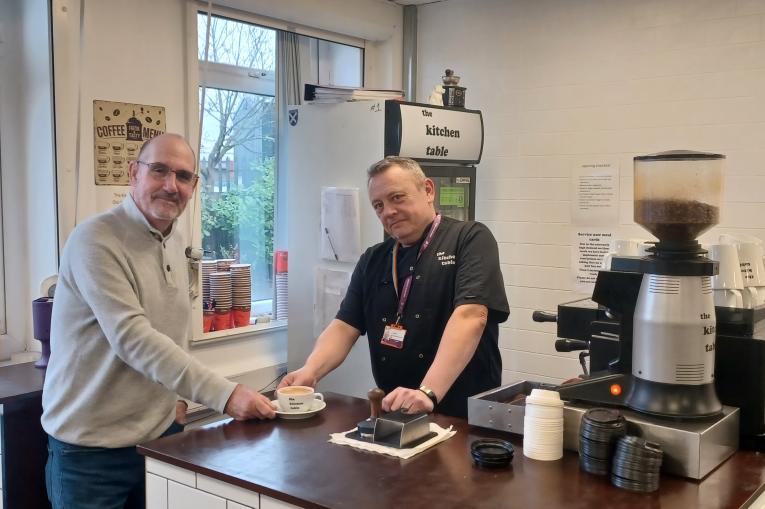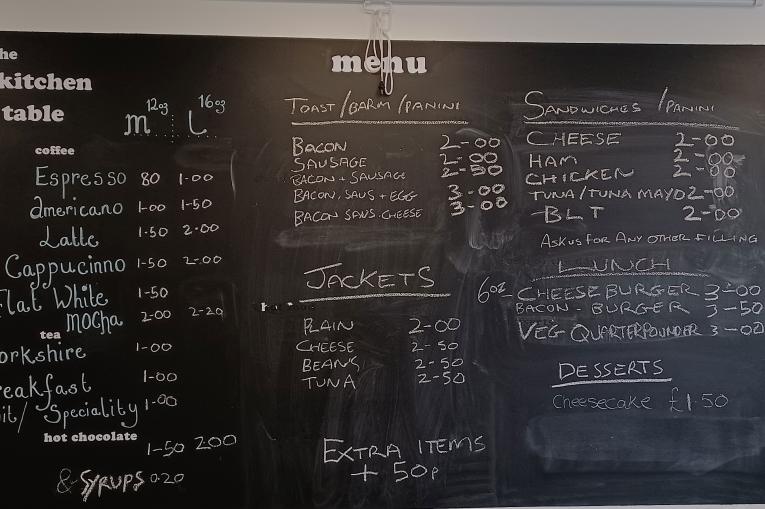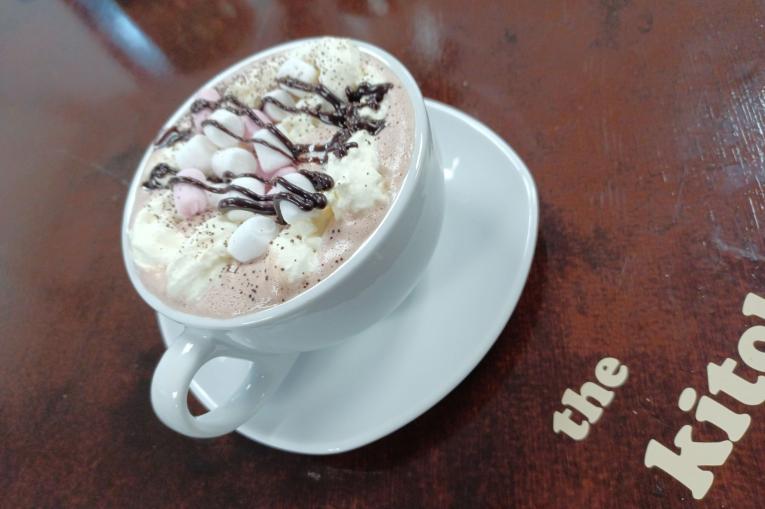3 February 2025

As you walk into the café you can tell something special is happening. A low hum of laughter and chatter builds, amid a smell of home-cooked food. Every table is full of people eating, laughing and talking.
Change Grow Live staff members and volunteers sit together with people who use the services and those in recovery, family members and people from the local community, all sharing stories and ideas.
Tony Clarke is the heart and soul of the Kitchen Table Café. Along with Service Manager Charlotte Roberts, his perseverance and dedication has ensured the café is the focal point of recovery in Halton.
From inspiration to reality
It all started from necessity, says Tony, who began his own recovery journey at Change Grow Live’s Integrated Recovery Service in Halton. Back in 2017, he was attending the service every day as a peer mentor and facilitator and noticed the number of people who were struggling to feed themselves. This was before the widespread introduction of foodbanks, and there was no safety net for people who were unable to make ends meet.
Tony loved cooking and had completed his catering NVQ while in prison, so when he saw that the service’s fully fitted kitchen was unused, it gave him an idea.
“We started the breakfast club with £20, a toaster and tea. Instantly, the demand was high. Within a few weeks, it became apparent that we needed to do more. We had some tins of soup donated, so soup and a bread roll for £1 joined the menu. We then added jacket potatoes, and the lunch club was born.”
The name, he explains, was inspired by hearing customers’ conversations, “about football, loss, recovery, television… talking about life. It was like watching the family at the kitchen table.”
About six weeks in, the café received a donation of 100kg of courgettes. Tony was not fazed. “I love a challenge, and the first official meal we served at the café was roasted courgettes stuffed with bacon and borlotti beans. I never knew what borlotti beans were at that point!”
The team had to adapt rapidly. Donations came in weekly and the menu was based on what was available, fresh and healthy. Tony did the shopping on his bike, with a little trailer on the back. He pedalled around in search of the best deals and secured more donations along the way.
As the country went into lockdown in 2020, the café was forced to close. But once restrictions were lifted, it was clear that the need was still great. With a grant from Public Health England to fund Tony’s role, and the donation of a top-of-the-range espresso machine from the outgoing crime commissioner, the Kitchen Table Café reopened. Tony was back at the helm – with big plans.
Friday night supper club
Every Friday, the café serves a three-course meal, where people can pay as much or as little as they wish or can afford. Serving a three-course meal was particularly significant, says Tony.
Any profit from the café goes into a meal card scheme. The cards are provided to everyone in treatment so that they can enjoy a free meal when needed. The café’s original target was to provide 500 meals a year, but it's been so successful that they now serve around 100 meals a month. Customers can also choose to ‘pay it forward’ – covering the cost of another meal.
“I have been coming to the service for a few years, but I was withdrawn and had closed myself off from the world, and I didn’t think I could change. My keyworker gave me one task: to go to the café. When I first walked into the café, I saw people I knew, who had walked in my shoes and I had used with in the past and they looked happy, and healthy. I started to believe I could change and I started coming in regularly.” – Stuart, regular café volunteer
A menu with meaning
Tony has sought creative ways to help customers feel part of the café. “I ask new customers what their favourite meal is and then add it to the menu, which helps them feel more invested in us,” he says.

“We often have pea and ham soup on the menu to honour the late mother of one of our regulars. Seeing it on the menu makes him happy. It might seem like a small thing, but for some people, it's the only kindness they've been shown.”
“We also make curry or a rice dish every Tuesday because one of our volunteers wanted to learn how to make them, so I showed him how to make a curry from scratch.”
The team is also establishing a herb garden to provide the café with more fresh, healthy ingredients.
More than just meals
The café’s reach extends far beyond mealtimes. It has its own football team, and there are regular games nights and other activities, which are particularly important for those in early recovery. The service opened for Bonfire Night so that people could watch the firework display, and between 70 and 90 people all eat Christmas dinner together, ensuring no one is alone.
The café’s success is also down to the team of passionate volunteers. Up to seven work there at any one time; most have lived experience. Some simply enjoy serving coffee and welcoming guests, while for others, the café is the perfect springboard to build confidence and employability skills – a first step back into employment.

“I've gone from not being able to have a conversation with the local shopkeeper, to someone who chats to everyone. I see all the regular people and I have a rapport with them, I pass on advice and encouragement. It’s good to be a source of inspiration for others. I started to believe in myself again.” – Stuart, regular café volunteer
For other services considering opening their own breakfast club or café, Tony has this advice: “Create a relationship with your environmental health officer straight from the start – they will guide you. The ‘Safe food, better business’ legislation is simple to understand and implement.”
The benefits the cafe brings to the service, he says, makes all the hard work worth it.
“I get so much more honesty over the coffee table than I ever did over the desk. The fact that we've got a lot of people in recovery here is an inspiration to the people who are coming in, who are not in recovery yet. People stay within our positive recovery environment for longer, because we've got so much more to offer.”
At the end of the day, Tony says, “it wasn't really about coffee; it was about feeding people and treating people well. Clearly it struck a chord because It's been amazingly supported by everyone.”
